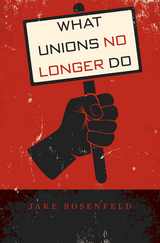
From workers’ wages to presidential elections, labor unions once exerted tremendous clout in American life. In the immediate post–World War II era, one in three workers belonged to a union. The fraction now is close to one in ten, and just one in twenty in the private sector—the lowest in a century. The only thing big about Big Labor today is the scope of its problems. While many studies have attempted to explain the causes of this decline, What Unions No Longer Do lays bare the broad repercussions of labor’s collapse for the American economy and polity.
Organized labor was not just a minor player during the “golden age” of welfare capitalism in the middle decades of the twentieth century, Jake Rosenfeld asserts. Rather, for generations it was the core institution fighting for economic and political equality in the United States. Unions leveraged their bargaining power to deliver tangible benefits to workers while shaping cultural understandings of fairness in the workplace. The labor movement helped sustain an unprecedented period of prosperity among America’s expanding, increasingly multiethnic middle class.
What Unions No Longer Do shows in detail the consequences of labor’s decline: curtailed advocacy for better working conditions, weakened support for immigrants’ economic assimilation, and ineffectiveness in addressing wage stagnation among African-Americans. In short, unions are no longer instrumental in combating inequality in our economy and our politics, and the result is a sharp decline in the prospects of American workers and their families.

“This is the book to throw at your human resources director—not literally, of course—when any attempt is being made to bamboozle you about how decisions on pay have been made…It is a closely argued, thoroughly researched treatise on how we got here and how pay could be both fairer and more effective as a reward.”
—Stefan Stern, Financial World
“A flat-out revelation of a book by one of the nation’s top scholars of the labor market…required reading for anyone who cares about the future of work in America.”
—Matthew Desmond, author of Poverty, by America
“Jake Rosenfeld pulls back the curtain on the multifaceted cultural, institutional, and market forces at play in wage-setting. This timely book illuminates the power dynamics and often arbitrary forces that have contributed to the egregious inequality in the U.S. labor market—and then lays out a clear blueprint for progressive change.”
—Thea Lee, President of the Economic Policy Institute
Job performance and where you work play a role in determining pay, but judgments of productivity and value are highly subjective. What makes a lawyer more valuable than a teacher? How do you measure the output of a police officer, a professor, or a reporter? Why, in the past few decades, did CEOs suddenly become hundreds of times more valuable than their employees? The answers lie not in objective criteria but in battles over interests and ideals.
Four dynamics are paramount: power, inertia, mimicry, and demands for equity. Power struggles legitimize pay for particular jobs, and organizational inertia makes that pay seem natural. Mimicry encourages employers to do what their peers are doing. And workers are on the lookout for practices that seem unfair. Jake Rosenfeld shows us how these dynamics play out in real-world settings, drawing on cutting-edge economics and original survey data, with an eye for compelling stories and revealing details.
You’re Paid What You’re Worth gets to the heart of that most basic of social questions: Who gets what and why?
READERS
Browse our collection.
PUBLISHERS
See BiblioVault's publisher services.
STUDENT SERVICES
Files for college accessibility offices.
UChicago Accessibility Resources
home | accessibility | search | about | contact us
BiblioVault ® 2001 - 2024
The University of Chicago Press









